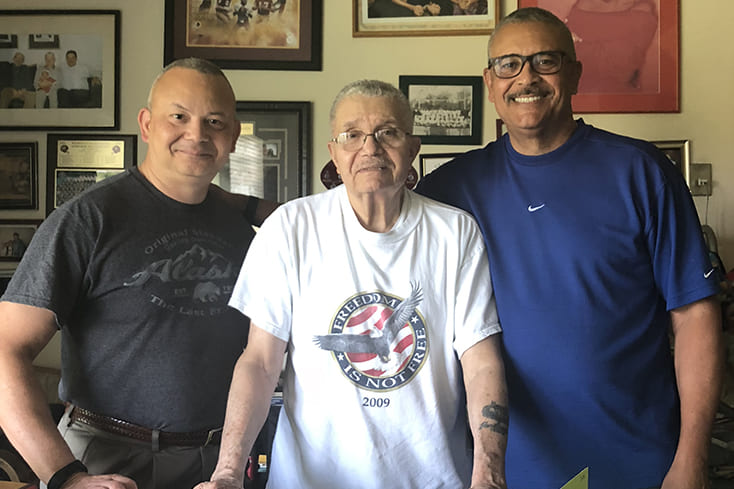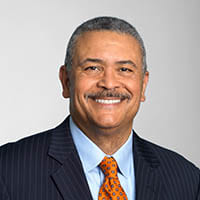June 25, 2021
By Daniel H. Gillison

This past Sunday was Father’s Day, and it’s had me thinking all week about the legacy of my own father, the legacy I am passing down to my own son and, in general, what it means to be a man.
My dad was a paratrooper in the military, then he was a bookbinder by day and a cab driver by night. He would leave for work before my brother and I woke up, and he would work until after we had gone to sleep. My dad loved us deeply, and to him, love meant working hard — and then working harder — to provide food and shelter for his family.
In many ways, I’ve followed in my dad’s footsteps, and I’m thankful for the strong work ethic he passed down to me. I left home at 17 and have been working ever since. But for a long time, I didn’t understand the concept of a vacation or “self-care.” After all, my dad would only take time off from one job to go work at another job.
It’s only been since I’ve gotten older that I’ve thought more seriously about the needs of my own mental health and have even begun hugging my dad and telling him I love him. We men, and especially us men of color, have a difficult time expressing our feelings and prioritizing our emotional needs. But the need to do so is urgent.
Did you know that more than 6 million men live with depression each year, men are almost 4 times as likely to die from suicide as women, and 1 in 5 men will develop alcohol dependency during their lives? It’s even worse for men who identify with groups that have been historically marginalized. LGBTQI men are more likely to develop mental health disorders than heterosexual men. Young boys of color show greater depression than girls of all ethnicities. And Native American men have the highest suicide rates of all.
Despite all this, men are less likely than women to seek help for depression, substance use and stressful life events. Why? One of the biggest reasons we often feel uncomfortable talking about our mental health, downplay our symptoms, and fail to reach out for help has to do with stigma and cultural norms about what it means to be a man.
In the United States, we’ve grown up being told we need to “man up” or “stop acting like a girl” if we’ve shown sensitivity, creativity, or vulnerability. We’ve grown up being discouraged from showing our emotions because “boys don’t cry” and being encouraged to engage in risky behavior because “boys will be boys.” These examples of toxic masculinity don’t only potentially put others in harm's way through the perpetuation of rape culture and violence, they are also deeply detrimental to our own personal well-being.
As men, most of us believe there is strength in silence; but it’s absolutely the opposite when it comes to mental health. And as a society, we often normalize anger, irritability, aggressiveness, alcohol misuse, and compulsive behavior in men. But these are actually warning signs of serious mental health conditions.
We need to change the narrative of what it means to be a man. We need to insist in every corner of society that showing vulnerability is a sign of strength, not weakness. We need to prioritize our mental health just as much as we prioritize being strong physically. After all, most of us wouldn’t hesitate to go see a doctor if we were injured playing a sport, so why should we hesitate to see a specialist if we are struggling mentally or emotionally?
What I wish most for my own son is for him to look at his whole health. I want him to think about his patterns — how he is eating, how he is sleeping, how he is interacting with others. I want him to develop healthy coping skills and healthy friendships. I want him to be intentional and aware of how he is managing stressors…or how they are managing him.
And I know that if I want these things for others, then as a father, as a CEO, and as an older Black man in America, I must model them myself. That’s why I make a conscious effort to put my ego aside, to talk openly about my own feelings at work, and to take regular breaks to connect with my own family, mentors, and friends.
Because as men, we have to get out of our own way: We need to start being more concerned about what it means to be holistically healthy, and less about whatever it means to “be a man.”
Men's Mental Health Resources:
 Daniel H. Gillison, Jr. is the chief executive officer of NAMI (National Alliance on Mental Illness). Prior to his work at NAMI, he served as executive director of the American Psychiatric Association Foundation (APAF) in addition to several other leadership roles at various large corporations such as Xerox, Nextel, and Sprint. He is passionate about making inclusive, culturally competent mental health resources available to all people, spending time with his family, and of course playing tennis. You can follow him on Twitter at @DanGillison.
Daniel H. Gillison, Jr. is the chief executive officer of NAMI (National Alliance on Mental Illness). Prior to his work at NAMI, he served as executive director of the American Psychiatric Association Foundation (APAF) in addition to several other leadership roles at various large corporations such as Xerox, Nextel, and Sprint. He is passionate about making inclusive, culturally competent mental health resources available to all people, spending time with his family, and of course playing tennis. You can follow him on Twitter at @DanGillison.
We’re always accepting submissions to the NAMI Blog! We feature the latest research, stories of recovery, ways to end stigma and strategies for living well with mental illness. Most importantly: We feature your voices.
LEARN MORENAMI HelpLine is available M-F, 10 a.m. – 10 p.m. ET. Call 800-950-6264,
text “NAMI” to 62640, or email. In a crisis, call or text 988 (24/7).